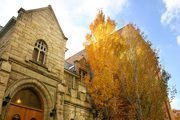We honor the history of our former space, Eldred Theater.
We thank the many artists, guests, and patrons who made this space a unique and special place to experience theater.
Written by Susan Griffith for Case Campus News
Eldred Hall is best known for theater, but its original intent upon opening was as a spiritual center of student life at the old Adelbert College.
Rev. Henry B. Eldred donated $15,000 in 1897 to have a YMCA built. It became the student center with a snack bar, barber shop, and a meeting room on the second floor for student clubs and classes. Eldred Hall also is one of the few remaining buildings of Adelbert College.
It took only a year for theater to come to Eldred. In 1898, the Sock and Buskin Club, a company of student actors, began to stage student-written revues, popular and “quick hit” comedies, and Shakespearean plays. Flora Stone Mather College at the time also had a new group of young female actors taking to the stage as the Curtain Players.
By the 1920s, a community group of actors called the Eldred Players joined the drama clubs in providing theater for Cleveland.
Theater remained an extracurricular activity until 1931, when Barclay Leathem, an English professor with his law degree from Western Reserve University, founded the Department of Drama and Theater. The department originally offered theater courses at the graduate level and established the University Players. It would take several more years before theater would be offered to undergraduates.
Over the intervening years until his retirement in 1971, Leathem shaped the course for theater’s future at Case. He also became a leader in the field of theater education. Among his contributions was to establish one of the first college courses on television.
“He was one of the giants of theater education in America,” said Charles Lawrence, former technical director in the Department of Theater who researched Eldred’s past through the University Archives.
Lawrence said Leathem brought avant-garde theater to Case with his first production of August Strindberg’s Spook Sonata in 1939, after a new stage was added to Eldred with a $35,000 gift from the Rockefeller Foundation in 1938.
Leathem established working relationships with local theaters, including The Cleveland Play House and Karamu House. He also was an advisor to Cleveland’s first television station, WEWS, in 1948.
A 1936 Flora Stone Mather graduate, Nadine Miles, left Cleveland and went on to star on Broadway. She returned to Cleveland to join Leathem in the department and became one of Cleveland’s and Case’s main artistic forces in theater, directing such productions as The Fly and T.S. Eliot’s Murder in the Cathedral. She retired in 1972.
Leathem brought dance to Case through Kathryn Karipides, who at the time had a national dance company. Leathem also established a summer theater group called the Barn Players, which performed at Squire Valleevue Farm. Farm performances ended with the rationing of gasoline during World War II. The tradition of strong theater programs established by Leathem continued under the leadership of John Orlock, who with Peter Hackett from The Cleveland Play House designed a new professional actor training program in 1995. The joint program celebrated its 20th anniversary in 2016-17.

